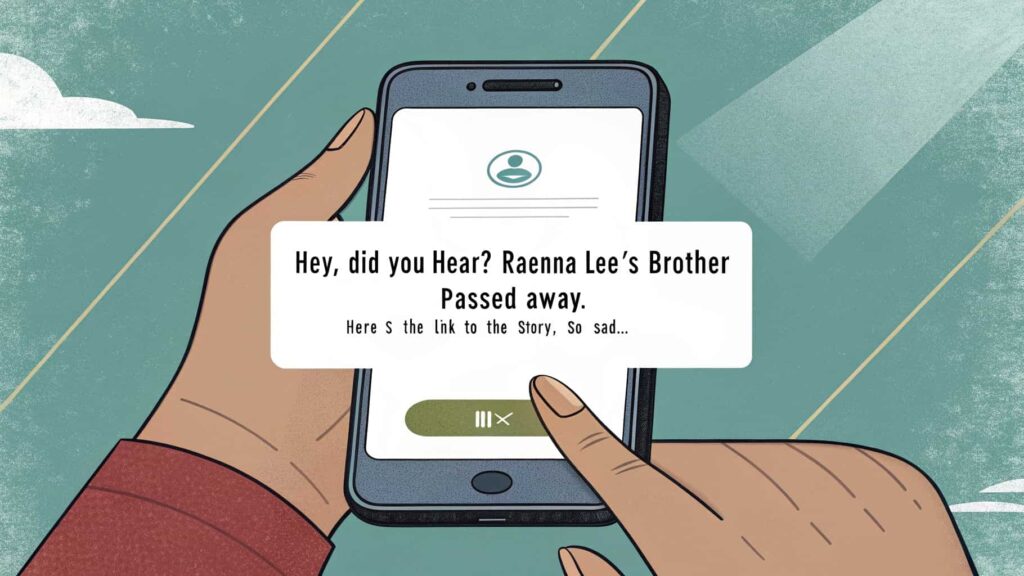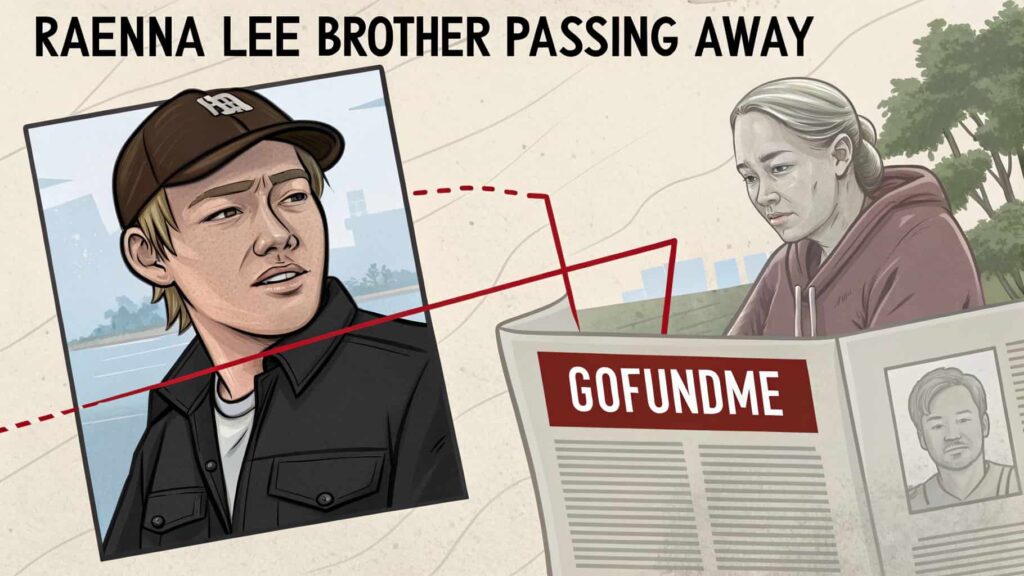In today’s digital age, scams are evolving faster than ever, preying on human emotions and exploiting public figures. One such alarming incident that has been circulating across platforms involves a message claiming that “Raenna Lee’s brother passed away.” This seemingly tragic text is not just misinformation—it’s part of a growing trend of emotionally manipulative scams designed to deceive people for financial gain or personal data. If you’ve encountered the “Raenna Lee brother passed away text scam,” you’re not alone.
This article sheds light on the scam, explores how it works, why it’s spreading, and how to stay protected from such malicious tactics.
Who Is Raenna Lee?
Before diving into the scam itself, it’s essential to understand who Raenna Lee is. Raenna Lee is a relatively low-profile online personality, occasionally seen in niche influencer circles or social media platforms, but she is not widely known in mainstream media. That’s precisely why this scam is puzzling and effective at the same time—because it seems like an intimate, insider tragedy, tricking recipients into believing it’s a personal or shared connection.
What Is the “Raenna Lee Brother Passed Away” Text Scam?
The scam typically involves a message or SMS that reads something like:

“Hey, did you hear? Raenna Lee’s brother passed away. Here’s the link to the story. So sad…”
The message is designed to grab your attention emotionally. It may be followed by a suspicious link, often disguised as a news story, memorial post, or fundraising campaign.
When you click the link, several dangerous things could happen:
- You might be redirected to a phishing site designed to steal personal information.
- The link could lead to malware downloads that infect your device.
- You may be asked to donate money to a fake fundraiser.
- In some cases, it could request login credentials for social platforms like Facebook or Instagram.
Why Is This Scam So Effective?
Scammers have mastered the art of emotional manipulation. This scam is effective for several reasons:
1. Shock and Sympathy
News of someone’s death, especially a family member, triggers immediate emotional responses. Scammers rely on your sense of empathy and curiosity.
2. Personal Connection Illusion
The scam may be sent from someone you know—if their account has been compromised. This increases the trust factor, making it more likely you’ll click the link.
3. Viral Nature
Once a victim’s account is accessed, the scam can be propagated automatically to their contact list. The message spreads like wildfire.
The Psychology Behind the Scam
Understanding the psychology behind these types of scams helps in identifying them early. Here’s what scammers are exploiting:
- Urgency: You feel compelled to act quickly—either to check the story or offer condolences.
- FOMO (Fear of Missing Out): You might think others know something you don’t.
- Guilt or Concern: You may feel bad for not knowing sooner and rush to catch up.
- Social Proof: If others in your circle are sharing or talking about it, it feels more real.
Also read: ghuk‑y44551/300
How the Scam Spreads: Platforms Used
The “Raenna Lee brother passed away text scam” has been spotted across various digital platforms. Here’s a breakdown:
1. Text Messages (SMS)
Many users report receiving this scam via traditional SMS. Since phone numbers are often linked to accounts or mailing lists, scammers use bulk messaging tools.
2. WhatsApp & Messenger
These platforms are highly susceptible to forwarded hoax messages and viral scams.
3. Facebook
Scammers may use compromised accounts to post the message on timelines or send it via Messenger.
4. Instagram
Some victims report getting DMs containing the link with emotional captions.
5. Email
In fewer cases, the scam is disguised as a forwarded email with a memorial subject line.
Real or Fake: Has Raenna Lee’s Brother Actually Passed Away?
As of the latest verified reports, there is no public information or credible source confirming the death of Raenna Lee’s brother. The message is fabricated and part of a calculated scam.

It’s important to remember:
- No official media outlet has covered any such story.
- No verifiable GoFundMe or obituary page exists linked to Raenna Lee.
- Many recipients of the message have confirmed it was a scam or phishing attempt.
Red Flags That It’s a Scam
Even if you aren’t familiar with scams like these, there are telltale signs to watch for:
1. Suspicious Links
URLs that look unusual or include long strings of characters are a strong indicator.
2. Grammar and Spelling Errors
Many scams originate from non-native speakers and contain awkward language.
3. Emotional Bait
If a message makes you feel strong emotions—fear, sadness, or urgency—it’s likely engineered to manipulate you.
4. Unverified Senders
Messages from unknown numbers or new social accounts should always be treated with caution.
5. Requests for Money or Info
Any message that eventually asks you to donate, log in, or enter personal details is suspect.
What to Do If You Receive the Scam Text
1. Don’t Click the Link
The first and most important step is do not click the link.
2. Delete the Message
Remove the message from your inbox or app to prevent accidental clicking.
3. Warn Others
Inform friends or family who may have received the message from you (if your account was hacked).
4. Change Your Passwords
If you clicked the link or entered credentials, change your passwords immediately.
5. Report the Scam
Report the number, email, or account to the platform it was sent from. You can also report scams to cybercrime units or local authorities.
Also read: Statens Luftfartsvæsen
How to Protect Yourself from Similar Scams
Digital hygiene is crucial in today’s scam-filled internet. Here are some best practices:
Enable Two-Factor Authentication (2FA)
2FA adds an extra layer of security to your accounts, making it harder for hackers to access them.
Use a Password Manager
Secure, unique passwords for each account are key to preventing compromise.
Keep Your Device Updated
Regular updates patch security holes that malware might exploit.
Educate Your Circle
Scams thrive on ignorance. Educate friends, family, and coworkers about common scam patterns.
Avoid Clicking Unfamiliar Links
Even if they come from trusted contacts, always verify before clicking.
Are There Legal Actions Against These Scams?
While identifying individual scammers is difficult due to international operations, governments and tech companies are cracking down:
- FTC (U.S.) and Cyber Crime Cells (Global) track phishing scams.
- Platforms like Facebook and WhatsApp regularly remove reported scam content.
- Phone companies sometimes block mass-messaging sources upon report.
You can also file complaints with:
- FTC Complaint Assistant (US)
- Internet Crime Complaint Center (IC3)
- Google Safe Browsing
Why Use a Public Figure Like Raenna Lee?
This type of scam is particularly deceptive because it targets an obscure or semi-known name like Raenna Lee:
- Unverified Fame: Not enough information exists to disprove the claim immediately.
- Low Visibility: Public doesn’t question such names the same way they might with A-list celebrities.
- Fictional Layer: Some scammers even fabricate personas, and “Raenna Lee” could be partially or wholly fictional.
Could Raenna Lee Be a Made-Up Name?
While some traces of Raenna Lee might appear online (possibly as an influencer or content creator), it’s also highly possible that:
- The name is a fabricated identity used by scammers.
- They’ve created dummy social profiles to make the story look real.
- There’s no actual “Raenna Lee” facing this tragedy.
That’s what makes the scam even more sinister—it manipulates reality and fiction to trap users.
Frequently Asked Questions
1. Is Raenna Lee a real person?
There’s limited verifiable information about Raenna Lee, suggesting she may be a fictional or obscure persona used in scams.
2. Did Raenna Lee’s brother actually pass away?
No credible sources confirm this. It’s part of a phishing text scam.
3. What happens if I click the link in the message?
You may be redirected to a phishing site, download malware, or be tricked into sharing login details or money.
4. How did the scammer get my number?
Your number could have been exposed in a data breach or shared through social connections.
5. What should I do if I clicked the link?
Change your passwords, run a malware scan, and monitor your accounts for unusual activity.
6. Can I report the scam to authorities?
Yes. Use services like the FTC, IC3, or your country’s cybercrime unit to report scams.
7. Why do scammers use death hoaxes?
Death hoaxes generate emotional responses, increasing the chance users will click without thinking.
8. Can clicking a link infect my phone?
Yes. Malware and tracking tools can be installed silently, especially on older or unsecured devices.
9. Is it safe to warn others by forwarding the message?
No. Always create a new message instead of forwarding the scam, so you don’t inadvertently spread it.
10. Will blocking the number help?
Yes, it can stop further messages from that source, but scammers often use rotating numbers.
Conclusion
The “Raenna Lee brother passed away text scam” is a deceptive tactic that preys on emotions to spread malware, steal personal data, or collect money through fake links. While the message may seem real or concerning, it’s part of a larger trend of emotionally manipulative scams. Always think twice before clicking on suspicious links, and take steps to protect your personal information. Staying informed and alert is the best defense against these types of cyber threats.
Related post:













